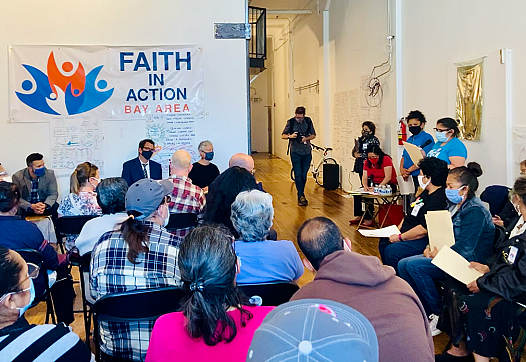Part 2: Multibillion-dollar company delays Hunters Point housing renovation, cites lack of funds
This story was originally published in Mission Local with support from the 2022 California Fellowship.
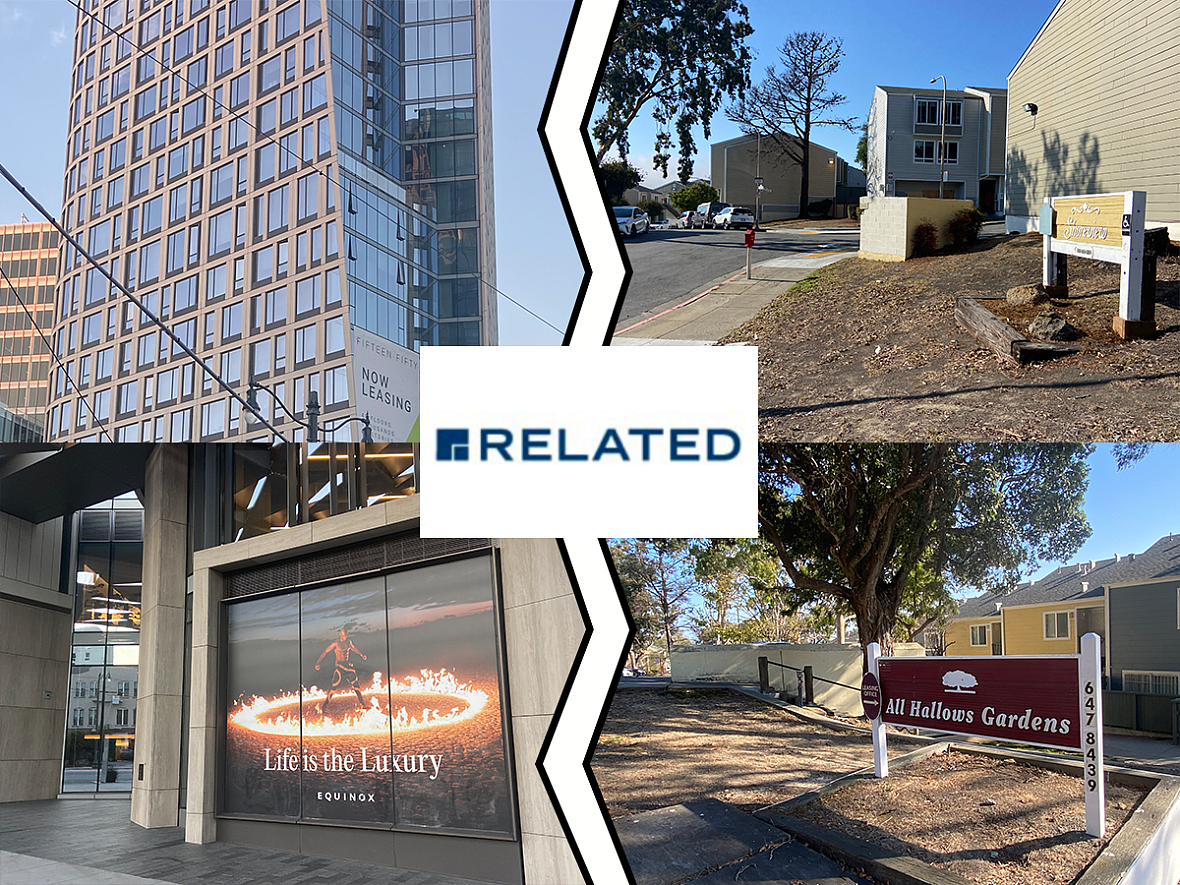
San Francisco properties within Related Companies. From Top left to right: A market-rate apartment at 1550 Mission St., and subsidized housing Shoreview Apartments in Hunters Point. Bottom left to right: Equinox, a gym owned by Related Companies founder Stephen Ross; All Hallows Garden Apartments in Hunters Point. Image designed by Chuqin Jiang.
Photos by Annika Hom.
When the multibillion-dollar real-estate firm Related Companies bought four shabby subsidized apartment complexes in Hunters Point, plans to renovate were already in motion. It was 2018, and management primed tenants with the possibilities of what was in it for them: A rehab scheduled for 2023.
Management had an interest in renovating, too. It wasn’t just to repair the pipes that ruptured and gushed brown water into the units, or to make headway on broken stoves and worn-out stairs reported in tenant work orders. It wasn’t just to abate stubborn rodent infestations that forced some low-income residents to forgo crucial housing subsidies and abandon their apartments.
Related’s leaders knew it could tap properties on The Hill for another incentive: Money.
If done right, acquiring and rehabilitating aged properties can potentially be a legal, lucrative business strategy that both pays for the renovation and generates tens of millions in profit. Nonprofit developers are required by law to use the surplus to further their mission, which usually focuses on affordable housing; for-profits, like Related Companies, can, but are not required to, reinvest profits in housing.
Affordable housing developers like Related Companies are extremely intimate with this process, called “recapitalization.” As soon as the company’s leaders caught wind that the Hunters Point complex on The Hill might be up for sale, those properties became part of this strategy — a strategy that Related and other companies rely on frequently, according to several experts in subsidized housing. Following the renovation, one that could be lucrative on its own, Related could also legally apply to increase rents, giving another boost to its bottom line.
Meanwhile, the notion of a renovation thrilled tenants, who had faced a multitude of issues under their last property owner. They thought perhaps the rich company could better manage their community of four properties. And, as the 2023 renovation date crept closer, they had questions: How long would they be moved out? When did they need to pack?
The perfect time to answer all of these presented itself one September evening, during a town hall held in the cramped community room of the 46-year-old Hunter Points complex. Lori Horn, Related’s senior vice president of west affordable housing, and Danny Rivera, regional vice president, came up The Hill sporting blazers and button-down shirts, and joined in.

Residents arrived in sundresses, hoodies, and jeans. One, stopping by the meeting on the way to work, dressed in her uniform for her job as a security guard. Horn spent the better part of an hour listening to their litany of problems, ranging from lack of heat to rodent infestations. Then, she ripped off the band-aid: The 2023 renovation was off.
Why?
The money wasn’t there.
‘The next deal’
When Matthew Finkle finds himself devoid of daily motivation, he wills himself to stare straight into the face of a Siberian tiger, he told a Housing Finance reporter in 2014. He kept a footlong statue of the animal on his desk which, along with the prop ax from the “Breaking Bad” set, were among Finkle’s most revered office decor.
One year in as president of Related Affordable, a division of Related Companies, Finkle told the reporter that his desk-pet reminded him how to approach this business: Be fast. Nimble. Tough.
No person ascends to the top brass of one of the country’s largest real-estate companies without something to show for it: From 2003 to 2014, Finkle helped Related Companies close $1 billion in affordable housing deals. He told Housing Finance, a publication aimed at the housing industry, that he cared about high-quality services to tenants, too, and valued his company’s role in maintaining inexpensive housing for lower-income residents.
Like other affordable housing developers and experts, Finkle understood that purchasing properties and renovating them with tax-credits could be especially profitable. A Project Based Section 8 property, like the ones on the Hill, bring in even more cash, thanks to its high, guaranteed rent subsidies.
“We recently purchased a group of Sec. 8 deals. … We were able to finance the acquisition with a … structure that provides a strong return” that “also provides us with the flexibility to recapitalize and rehabilitate the deals,” Finkle told the Housing Finance journalist four years before buying the Hunters Point properties. “Deals like these are a large part of our acquisitions strategy.”
“This framework enables us to critically evaluate each of our assets and make important portfolio-management decisions that maximize value,” he continued. “As deal people, we are always focused on the next deal.”
Recapitalization has the potential to be a great deal, and is a common and integral strategy in the affordable-housing world; securing government money enables projects to receive much-needed rehabilitations that are otherwise hard to finance. It is also deeply complex and, at times, opaque, causing some housing advocates to call for more transparency around how the surplus money generated after repairs gets spent.
Though laws require nonprofits to spend the excess in a way that honors their affordable housing mission, for-profits are unrestricted. Laws also allow properties to refinance and raise the rent to comparable market prices, which can be extremely profitable in Project-Based Section 8 properties. In both cases, the company decides how much of the windfall it injects into affordable housing or rehabbing the building, and how much it should pocket. John Elberling of the San Francisco nonprofit TODCO raised criticism when he told the SF Chronicle he did so, legally earning a “several million” dollar windfall that he uses to bankroll local political gambits. Through the same process, Mission Housing raised “millions,” but used it to stabilize its faltering portfolio.
The recapitalization windfalls are so large, in some cases, that a developer can accomplish some, or all, of these outcomes at once, experts said. In one example, a recent rehabilitation deal valued at $283 million would legally be able to pull out some $68 million, according to Phil Ritter, a former certified public accountant who worked on financing rehabilitated Section 8 properties. Since the company in this deal is a nonprofit, it must use that money to further its mission of affordable housing, Ritter explained: Buying or investing in other affordable properties, fixing up existing buildings and paying staff to do the job. If it was a for-profit, however, there’s no limit to how much of that money it takes for itself.
Many subsidized and affordable-housing properties are owned by for-profit developers, and, unlike a nonprofit or a publicly-held company, they are not required to reveal their balance sheets. Joel Rubenzahl, a consultant at Community Economics, Inc., a nonprofit group with expertise in financing affordable housing, criticized developers who recapitalize properties, pocket the profits, and fail to keep units habitable.
“Some actors have made a ton of money using the system,” Rubenzahl said. “It’s legal, designed to allow for significant profits.”
Related does not have a reputation of scamming its tenants, and instead is generally thought of as a decent company in California, according to Rubenzahl and some developers in the industry.
It’s unclear in past recapitalizations how much of the windfall Related used on rehabilitation and how much it took for itself. Public records requests filed by Mission Local offered little information, as laws shield documents that might disclose “trade secrets.”
The company declined an interview, and did not directly respond to financial questions. “Related can confirm it acquired the properties in 2018, with plans to conduct renovations in 2023,” a spokesperson for Related California, Evette Davis, wrote in an email to Mission Local.
What is clear is that the planned renovation has high potential to earn millions through the recapitalization process, enough to fix up the deteriorating apartments and earn some money.
Finkle chased these opportunities. He told the Denver Business Journal in 2018 he had watched the Apartment Investment and Management Company sell off its properties for years, especially after the company announced its exit from the affordable housing business in 2011. The two companies had developed a relationship, he added.
“We’ve always expressed an interest [in their affordable properties] if they ever exited the business,” Finkle told the Journal.
Seven years later, it paid off. When AIMCO sold all its affordable assets, including 604 apartments on The Hill, Finkle pounced.
Headed down-Hill
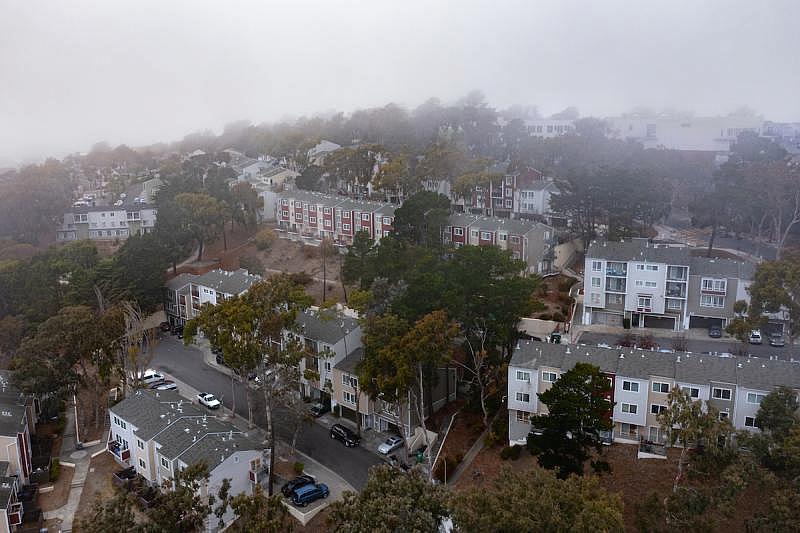
The Related subsidized apartments on The Hill in Hunters Point. Photo by Kerim Harmanci. Taken October, 2022.
In 2018, Related Affordable paid $590 million to take over AIMCO’s affordable portfolio assets, which included some 7,837 apartments across the country, and four garden-style apartment complexes in the Bayview, right on top of what locals simply call “The Hill.”
The Bayview properties checked off all the qualities of an attractive recapitalization deal. They were already owned by a limited partnership, allowing a subsidiary of Related to seamlessly take over as general partner after the 2018 acquisition. Enough private activity bonds and tax credits were floating around to ensure the government funding required for a rehabilitation would be there. No one could argue the apartments warranted repairs.
Time was the only remaining hurdle. Properties that previously used a tax-credit project must wait 15 years to execute the next one. Since AIMCO had recapitalized and rehabbed the Hunters Point properties in 2008, Related’s earliest opportunity would arrive in 2023.
No matter; Tigers wait. Finkle was experienced at juggling properties positioned at different points on the 15-year timeline. And until the plan proceeded, the properties would generate tens of millions annually, through rent alone.
So, not long after Related purchased the properties in 2018, management told tenants to expect a renovation in 2023. When tenants complained about faulty wiring or leaky pipes, management gently reminded them major renovations were coming — soon! A spokesperson for Related confirmed to Mission Local that the company planned on renovating next year.
And then the hurdle of time became a wall.
Catching multiple affordable housing developers off-guard, the bonds needed to finance rehabilitation became extremely hard to get. Demand increased, especially around 2020.
“It used to be that credits were available on demand, but about three years or so, the spigot turned off,” Rubenzahl said.
“The process to obtain them is more competitive than ever before,” added Noah Starr from the state treasurer’s office in an email to Mission Local. “There are not enough resources to award bond allocation and/or tax credits to every project that applies.” On top of that, experts said, the priority for public funds shifted to new construction instead of rehabilitation projects.
Suddenly, Finkle’s long-running, meticulous plan no longer looked like a sure thing. And Related, the company lauded in the past for its efforts on subsidized housing, was beset by the frustration brewing at its four properties on The Hill.
By 2021, residents at the Hunters Point properties were fed up with the deferred maintenance. Tenants Maika Pinkston and Janice Smith started organizing, tapping lawyers from Open Door Legal and activists from the Housing Rights Committee San Francisco to pitch in. Related Management brought in Lori Horn as senior vice president, and the soft-spoken woman promised to fix ongoing issues, some of which appeared to stem from AIMCO’s prior management. Residents demanded to know when.
Fast-forward to September, 2022, in the community room. Horn faced the residents to tell them the truth: The renovation was off. It wouldn’t be back until federal funding was available again.
She could not say when, exactly, because it could be a while. Competition for tax credits remains fierce among local developers, and multiple housing experts said it is unlikely the bond demand will balance supply for at least the next few years.
All the while, the consequences of this postponed renovation and lack of funds filter down to tenants on The Hill.
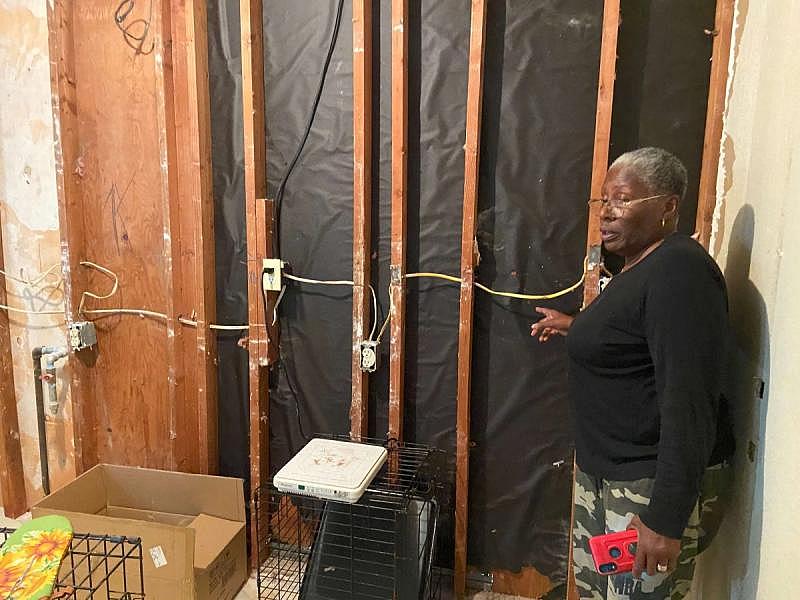
Margie Miller shows off her kitchen following the July 5 accident. Despite a notice of violation, management had not repaired it for at least three months. Photo taken by Annika Hom in Oct. 6, 2021.
Elizabeth Nunez, a former Related and AIMCO maintenance worker, argued that, at the very least, the pipe system needs to be redone. Leaky pipes, flooded toilets and broken sinks are ubiquitous at the complex, with the worst cases resulting in torrents of fetid water that exacerbate mold and mildew problems and cause health issues.
“The plumbing: They never fixed it,” alleged Nunez, referring to AIMCO’s $30 million renovation in 2008. She recalled trying to remedy residents’ leaks, only to discover her efforts were temporary fixes, given that the larger pipe system was the primary problem. Mission Local found that some apartments reported leaks more than once, which tenants blamed on surface-level repairs. Others have reported a downpour of water crashing into their unit after an upstairs neighbor showered.
“On all four properties, everybody has problems with water leaks from the ceiling,” Nunez said. “Replace the pipes.”
Regardless of the lack of federal funds catching a generally well-reputed company flat-footed, it’s Related’s responsibility to find the money to keep its tenants’ units in fair shape, said Rubenzahl. If the renovation plans “got messed up when the state stopped doing this financing, too bad. You need to do the work,” Rubenzahl said. “Real estate is big-risk, big-reward.”
Related, meanwhile, makes money no matter what, thanks to The Hill’s rent subsidies and to revenue from Related’s market-rate apartments and office spaces. The company can wait until the bond and tax credit situation improves. Its tenants, meanwhile, live in a complex where repairs are generally band-aid solutions.
In a sense, residents said, this is nothing new. They question the quality of AIMCO’s 2008 rehabilitation. The tax credits afforded tenants brand-new interiors, exteriors and landscaping, but residents wonder about the pipes and sewage system (as does Nunez). A San Francisco Business Times article from 2008 indicated that AIMCO’s fixes focused on “windows, siding, new flooring, carpet, countertops, kitchen and bathroom appliances.” Federal tax-credits paid for two-thirds of it.
It all worked out well for AIMCO, however; it pocketed a bundle from the property it mismanaged. After selling the apartments to Related, it walked away with $512 million.
‘The means and the obligation’
Whether Related has enough money without the federal funds to adequately fix tenants’ problems depends upon whom you ask. Related’s spokesperson, Davis, suggested the lack of tax credits had financially challenged the company and prevented it from large-scale repairs.
“We are actively working to secure the necessary resources for renovations; however, resources are limited and allocated according to the state of California’s priorities, something we have no control over,” Davis wrote in an email. The company is conducting “thorough” unit inspections, she said, and “Related works diligently to address habitability issues for its residents in a timely and effective manner.”
Outside of the company’s voluminous portfolio, housing experts argue that Related could help pay for repairs using money generated from federal rent subsidies. The subsidies cover rent, mortgage payments, expenses, and preservation funds and, after that, likely still turn a profit, according to housing experts.
Though Related would not share its books, it’s not impossible to estimate how much the company makes off The Hill, which gets guaranteed rent through its Section 8 subsidy.
While tenants only pay 30 percent of their rent, the government agrees to pay the difference up to the fair-market rent — which, in San Francisco, is notoriously high. The city’s fair-market rent in 2022 is $2,665 for a one-bedroom and capped at $4,283 for a four-bedroom, according to federal Housing and Urban Development contract data, and the four Hunters Point properties contain a mix of all types. HUD contract data shows 564 units receive subsidies, and thus, this year alone, rents would bring in roughly $22.8 million.
Then, other expenses must be subtracted, including operating expenses. On the high end, a multifamily apartment in the Bayview generally costs $15,000 a year in operating expenses, according to Ritter, the certified public accountant. The Hill’s operating expenses would amount to some $8.46 million, meaning the remaining rent profit is $14.3 million; subtract from that other costs.
“I would be amazed if Related isn’t having a large cash flow from each of these buildings,” Ritter said. “That has nothing to do with the bonds.”
Ritter said he would be surprised if Related’s units weren’t up to code, given the amount of money coming in. Ritter, however, hasn’t seen the sickening rat carcasses, the moldy ceilings, or the half-finished stairs. Residents live with it all.
Last year, a dozen tenants protested at India Basin Shoreline Park and passed out pointed fliers that called out Related Companies and its founder, Stephen Ross. This year, Ross, also the owner of the Miami Dolphins and the high-end national fitness chains Equinox and SoulCycle, was confronted with a lawsuit for allegedly pressuring former Dolphins head coach Brian Flores to violate myriad National Football League rules. In 2019, Ross, who at the time was worth an “estimated $7.7 billion,” sparked outrage for fundraising for President Donald Trump. This year, Related Companies faced controversy for cutting a check to the Santa Clara mayor’s re-election campaign, just after the mayor allegedly lobbied to help the company save money on a massive project, the San José Spotlight reported.
“Related Management has the means and the obligation to maintain their buildings in safe and habitable conditions,” the residents’ fliers said. “And they are neglecting their responsibility and putting tenants’ at risk.”
It’s all Related
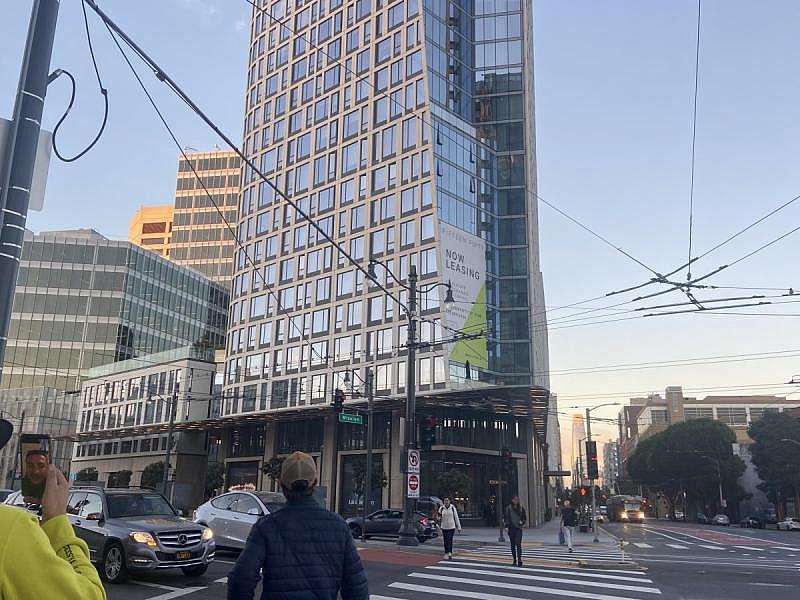
Related’s “Fifteen Fifty” luxury apartment at 1550 Mission St. Photo by Annika Hom. Taken Oct. 2022.

The Equinox gym at 1560 Mission St. Dubbed Equinox Van Mission. Photo by Annika Hom. October 2022.
On its own, Related Companies is one of the largest owners of affordable housing in the United States. The company continues to profit off deals in California, too, including in San Francisco. It enjoys a rosy reputation in the Golden State, largely thanks to Bill Witte.
Witte is the founder of Related California, a “fully-integrated firm” within Related Companies that formed in 1989 and has generally maintained affordable housing pretty decently, according to those in the industry. Now in his 70s, Witte banked a store of housing know-how from his former posts as top housing aides for mayors Art Agnos and Dianne Feinstein, and as a Housing and Urban Development staffer. That expertise and a sharp business sense allowed him to build in notoriously hard-to-build cities, like San Francisco, sparking awe among developers.
Most likable and unconventional about Witte, his peers and boss said, was his willingness to show up to tenant and community meetings.
“Bill, in my book, combines the very best of public service and used the values and principles of public service to do good in the private sector,” Agnos told the San Francisco Chronicle in 2020, just ahead of Related’s next project unveiling. “A lot of other developers overreach. He is the exception.”
That relationship helped Related score the affordable housing contracts, like the massive public housing renovation at Sunnydale, HOPE SF, and an affordable project, Upper Balboa Park Yard.
Related continues to develop San Francisco market-rate housing and luxury senior homes — yes, the one with rents starting at $7,200 a month — as well as clinching commercial contracts, too.
You can’t miss Related’s city-contracted, 460,000 square-foot office building towering above downtown. It’s the new headquarters for 16 city agencies, including Public Works, the Planning Department, and the Department of Building Inspection at 49 South Van Ness Ave.
So if a tenant from The Hill decides to report a housing violation to the city in person, they may saunter up to that building at 49 South Van Ness Ave. Along the way, the tenant would spot Related’s luxury apartments that host an onsite Equinox gym, likely put in thanks to Related’s financial affiliation. Maybe the tenant would notice the building’s giant Equinox ad, which depicts a tanned, muscular man standing in a ring of fire, and read the ad’s caption. It states, “Life is the luxury.”


